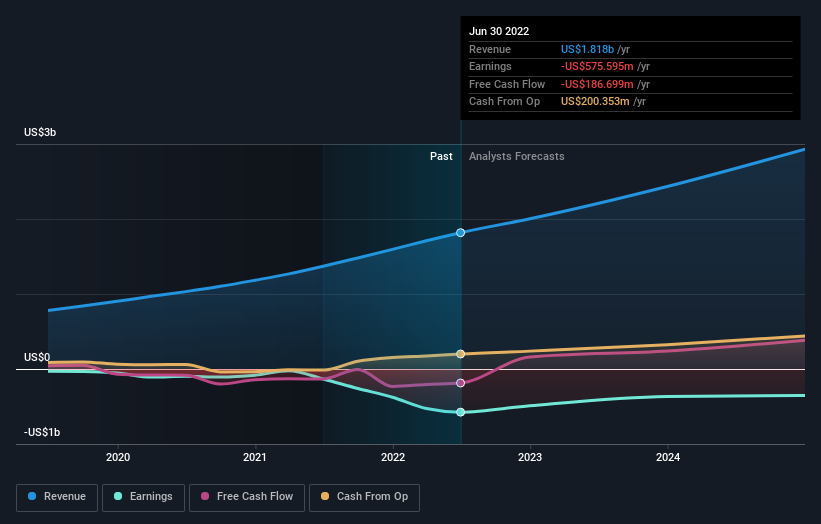- United States
- /
- Software
- /
- NYSE:RNG
RingCentral, Inc. (NYSE:RNG) institutional owners may be pleased with recent gains after 86% loss over the past year

To get a sense of who is truly in control of RingCentral, Inc. (NYSE:RNG), it is important to understand the ownership structure of the business. And the group that holds the biggest piece of the pie are institutions with 73% ownership. In other words, the group stands to gain the most (or lose the most) from their investment into the company.
Last week's US$126m market cap gain would probably be appreciated by institutional investors, especially after a year of 86% losses.
Let's delve deeper into each type of owner of RingCentral, beginning with the chart below.
Our analysis indicates that RNG is potentially undervalued!

What Does The Institutional Ownership Tell Us About RingCentral?
Institutional investors commonly compare their own returns to the returns of a commonly followed index. So they generally do consider buying larger companies that are included in the relevant benchmark index.
We can see that RingCentral does have institutional investors; and they hold a good portion of the company's stock. This implies the analysts working for those institutions have looked at the stock and they like it. But just like anyone else, they could be wrong. If multiple institutions change their view on a stock at the same time, you could see the share price drop fast. It's therefore worth looking at RingCentral's earnings history below. Of course, the future is what really matters.

Institutional investors own over 50% of the company, so together than can probably strongly influence board decisions. We note that hedge funds don't have a meaningful investment in RingCentral. Looking at our data, we can see that the largest shareholder is The Vanguard Group, Inc. with 8.9% of shares outstanding. BlackRock, Inc. is the second largest shareholder owning 6.3% of common stock, and Vladimir Shmunis holds about 6.2% of the company stock. Vladimir Shmunis, who is the third-largest shareholder, also happens to hold the title of Chairman of the Board.
Looking at the shareholder registry, we can see that 50% of the ownership is controlled by the top 16 shareholders, meaning that no single shareholder has a majority interest in the ownership.
Researching institutional ownership is a good way to gauge and filter a stock's expected performance. The same can be achieved by studying analyst sentiments. There are a reasonable number of analysts covering the stock, so it might be useful to find out their aggregate view on the future.
Insider Ownership Of RingCentral
While the precise definition of an insider can be subjective, almost everyone considers board members to be insiders. Company management run the business, but the CEO will answer to the board, even if he or she is a member of it.
Most consider insider ownership a positive because it can indicate the board is well aligned with other shareholders. However, on some occasions too much power is concentrated within this group.
Our most recent data indicates that insiders own a reasonable proportion of RingCentral, Inc.. It has a market capitalization of just US$3.3b, and insiders have US$347m worth of shares in their own names. That's quite significant. Most would be pleased to see the board is investing alongside them. You may wish to access this free chart showing recent trading by insiders.
General Public Ownership
The general public-- including retail investors -- own 16% stake in the company, and hence can't easily be ignored. This size of ownership, while considerable, may not be enough to change company policy if the decision is not in sync with other large shareholders.
Next Steps:
It's always worth thinking about the different groups who own shares in a company. But to understand RingCentral better, we need to consider many other factors. Consider risks, for instance. Every company has them, and we've spotted 2 warning signs for RingCentral you should know about.
Ultimately the future is most important. You can access this free report on analyst forecasts for the company.
NB: Figures in this article are calculated using data from the last twelve months, which refer to the 12-month period ending on the last date of the month the financial statement is dated. This may not be consistent with full year annual report figures.
New: AI Stock Screener & Alerts
Our new AI Stock Screener scans the market every day to uncover opportunities.
• Dividend Powerhouses (3%+ Yield)
• Undervalued Small Caps with Insider Buying
• High growth Tech and AI Companies
Or build your own from over 50 metrics.
Have feedback on this article? Concerned about the content? Get in touch with us directly. Alternatively, email editorial-team (at) simplywallst.com.
This article by Simply Wall St is general in nature. We provide commentary based on historical data and analyst forecasts only using an unbiased methodology and our articles are not intended to be financial advice. It does not constitute a recommendation to buy or sell any stock, and does not take account of your objectives, or your financial situation. We aim to bring you long-term focused analysis driven by fundamental data. Note that our analysis may not factor in the latest price-sensitive company announcements or qualitative material. Simply Wall St has no position in any stocks mentioned.
About NYSE:RNG
RingCentral
Provides cloud communications, video meetings, collaboration, and contact center software-as-a-service solutions worldwide.
Undervalued with reasonable growth potential.
Similar Companies
Market Insights
Community Narratives




